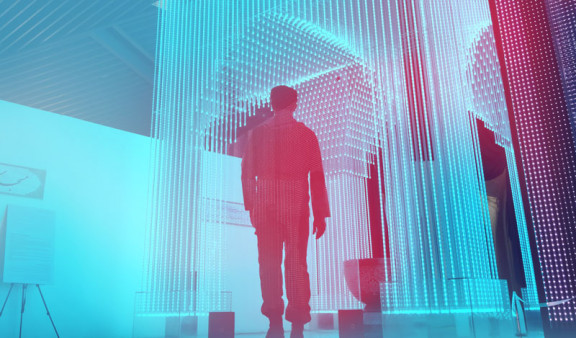
CES 2021: this year, it's all about the "new normal"
This 54th CES event did not escape the effects of the Covid-19 pandemic and, like everybody, it had to adapt.
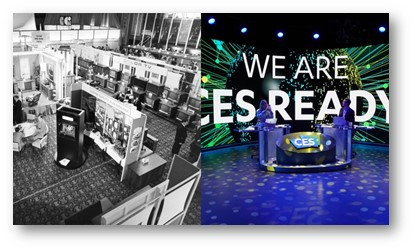
Supported by Microsoft, the Consumer Technology Association (CTA) set up a virtual portal bringing together keynotes, conferences and a space for discussions and meetings, as well as mini-websites of the some 1900 exhibitors taking part in this year's very different and somewhat nostalgia-tinged event. The opening keynote by Gary Shapiro (President of the CTA) rapidly immersed us in the reality of recent months, which have been so difficult for the whole planet, including some figures that showed just how much the crisis has driven us to act, innovate and unite in the face of the challenges of this new normal. Two sectors in particular grabbed my attention: healthcare and wellness; automotive.
A quick overview of CES 2021
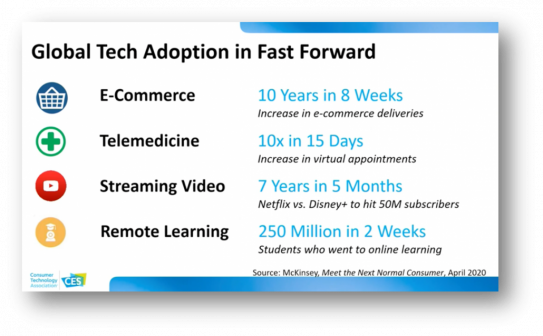
The pandemic has allowed us to move forward much more quickly with the adoption of new uses and technologies, in the areas of healthcare and wellness, education, enterprise digital transformation and commerce, where our consumption habits have been totally shaken up. Satya Nadella, CEO of Microsoft, stated that: "We’ve seen two years’ worth of digital transformation in two months." Doug McMillon, CEO of Walmart, added that: "We experienced 5 years acceleration in pick-up delivery in 5 weeks."
The health crisis also brought about increased awareness, through the new challenge presented by this more sustainable, more social, smarter and higher performing new normal. Many players on the international stage have adopted these values, such as Bosch, which used CES as a platform to announce that it had achieved carbon neutrality for all of its 400 sites throughout the world at the end of 2020 (independent audit in progress). They owe this success to a strategy based on four main areas: increasing energy efficiency, developing the production of renewable energy, buying more green electricity and compensating for unavoidable CO2 emissions.
Live sustainable #LikeABosch video
Samsung launched a new programme named 'Galaxy Upcycling at Home' aimed at enabling users to repurpose their old smartphones as handy household devices, for example as a baby phone by using the sound sensors to monitor the room, or as a long-distance remote control to turn on lights and open windows.
Healthcare and wellness in the spotlight
Against the backdrop of the Covid-19 pandemic, 2020 was a major year for healthcare innovations. As Forbes revealed: "Telehealth usage has soared from 11% of Americans using it in 2019 to 76% of Americans in 2020", a trend that has been reflected in the record level of investment in e-health startups, representing a total of 21.5 billion dollars (nearly 18 billion euros), or a 50% increase on 2019, according to the latest report by StartUp Health1.
Unsurprisingly, we have seen many examples of telemedecine at home with solutions that capture and monitor physiological parameters using the latest computer vision and artificial intelligence technologies, in order to provide better advice and improve monitoring of health and wellness. Here are a few that stood out:
- ai: an app that transforms any smartphone or tablet into a tool to monitor vital signs. By looking at the device's camera, the app can measure heart rate, heart rate variability, oxygen saturation, respiration, stress and, soon, blood pressure, in less than one minute and with medical-grade accuracy.
- HealthyU™, a smart remote surveillance system that is able to provide: 7-track ECG, heart sounds, heart rate, pulse oximetry, temperature, breathing rate, and blood pressure trend.
- Welldoc, an innovative platform (mobile app + user portal) to advise users and help them remain in good health. It addresses diseases such as diabetes, hypertension and heart failure.
It was also no surprise to see solutions designed to fight and protect against the Covid virus using air purification, such as the Airthings Wave, a device connected to a mobile app that monitors air quality in homes and offices and sends alerts. There is also the AirPop smart face mask, which is able to monitor your breathing and the state of the filter via a mobile device.
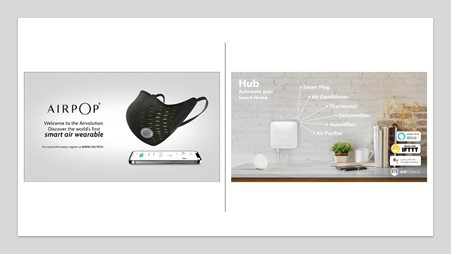
Finally, in terms of wellness, connected mirrors are still very popular this year, such as the mirrors produced by CareOs (a French company), which presented us its latest model 'Themis', a well-being companion in the form of a tablet that can recognise your face, understand voice commands, analyse your skin and provide various other services. In the same category, a solution nominated for the 2021 Awards from South Korea (which is always far ahead in this area) – the zmirror by ICON.AI – can perform skin analysis, is compatible with Alexa, and features a sound system designed by Harman Kardon.
The automotive sector: always moving forward
The automotive and new urban mobility sectors always have a strong presence at CES and this year was no different, with some of the most interesting conferences being on the topic of electric and autonomous vehicles. Let's begin with Sony, which returned with its all-electric car prototype: the Vision-S. This idea was inspired by the importance of user experience in new urban mobility and was bolstered by the audience's enthusiasm at CES 2020, which convinced Sony to go as far as testing it in real conditions in Austria, in December 2020.
They have worked with various partners (including Magna Steyr, AImotive, Bosch and Continental) to jointly build this first prototype, which has no less than 40 sensors, providing 360-degree vision and Level 2+ driver assistance. Sony is ultimately aiming for Level 4, which says a lot about the ambition of this project, as it remains just that (a project) for the time being. Watch this space...
Sony Vision-S video
[embed]https://youtu.be/HBGu43ElXZM[/embed] The CEO of Mobileye (owned by Intel), Professor Amnon Shashua, attended the event to present an approach that addresses the issue of scale, both in technological and commercial terms. It is essential to make the technology affordable, in line with the market for future autonomous vehicles, in order to make them accessible around the world.
Mobileye's solution comes in the form of a cost-efficient camera as the main sensor, combined with a new type of LiDAR (using photonics) offering superior reflexes than those that can be expected from a human driver. Thanks to True Redundancy™, Mobileye can deliver the performance level required to achieve Level 4 autonomy more rapidly and at lower cost than combined systems.
GM Exhibit Zero video
[embed]https://youtu.be/9DJRonCcmpQ[/embed] To end on a high note, I'd like to talk to you about General Motors and its vision for a future free of crashes, carbon emissions and congestion. The key to achieving this lies in the electrification of vehicles and connectivity of the urban ecosystem. Along with this transition to electricity is the announcement of the all-new Ultium platform, which will enable 30 new electric vehicle models to be brought to market.
This represents an investment of more than 27 billion dollars between now and 2025. GM's confidence in this transition is based on its future lithium-ion battery Ultium, which lasts longer (at least 640 km), weighs less (25% reduction) and costs less (40% reduction), thanks to a 70% reduction in cobalt, replaced by aluminium.
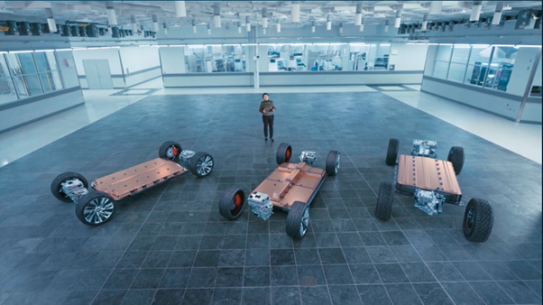
The other announcement made by GM is the creation of BrightDrop, a new business unit based on an electric vehicle, software and delivery service ecosystem. The aim is to help companies optimise their logistics and delivery services with its various products. The first model, the EP1 electric pallet, has been designed to easily transport packages over very short distances (from a warehouse to a shop, or a delivery vehicle to a customer's doorstep). The EP1 can be placed in the EV600 electric delivery truck, which has been tested by FedEx teams as part of a pilot project.
--- Unusual, unexpected and unpredictable, 2020 will undoubtedly have played a huge role in accelerating new practices, particularly in the area of digital transformation. CES 2021 was the perfect illustration of this, with many innovations that have shaken up habits in the areas of consumption, healthcare and wellness. This year's event may also have been a turning point (as Mary Barra, CEO of General Motors, rightly said) in a growing awareness of the importance of respecting the planet and people. We look forward to next year and some return to normality with an event in Las Vegas!
